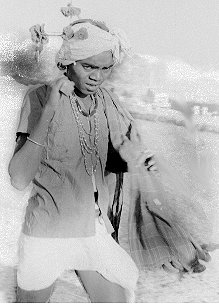Bus Journey to Bastar
Stories of Bastar Travel by K. L. Kamat
Excerpted from author's the Timeless Theater CD-ROM
| Introduction and Table of Contents |
Although the transportation facilities provided by the government are highly inadequate, I discovered that the shortcomings can be effectively utilized for one's benefit in Madhya Pradesh. The bus would stop at every lamp and post of Hanuman, Matirdevi, and Dongar Mataji, for blessings and temple-food. Instead of lamenting about waste of time and delays, I found out that engaging in small talk with co-passengers led me to local hero-stones (see also: Veergal), murals, wall paintings, etc. If the bus stops midway, one can enjoy the village entertainment. You could watch cock fights, bullock cart races, and the villagers. If the bus is late, you can try hot jelebies, puffed rice, and spicy masala tea, and you will be rejuvenated. If you want to watch the procession of a colorful tribal wedding, all you have to do is to ask the bus conductor to pull over. Without doubting you for a second, he'd say "Rukke" and stop; co-passengers are so civilized as not to question the purpose of stopping and would rather use the opportunity to answer nature's call or a cigarette's call. Sometimes I even managed to withhold the entire bus for half hour!
I like to sit beside the window during the travel, and hence make it point to arrive early for the departure so I can get a window seat. All the late comers begged me for a swap saying all kinds of excuses; one liked to smoke and wanted to let the smoke go out, another liked to chew paan, and the third one had a motion sickness and said he should be always ready to throw up. Being a South Indian is advantageous in those occasions: I either pretended not to understand the language or act as if I were a deaf. Typically a boy would come and request space for his brother-in-law or a holy man; four men from the same town wanted to play bridge and wanted me to move from where I sat. In order to focus my attention away from the proceedings of the inside of the bus, if I try to read the mileage signs, I found that they were all covered with family planning advocacy banners!
A traveler stretched his feet on the engine cover beside the driver. "Sir, this engine is like God to me; if you keep your feet on my God, you will have an accident. Please learn to sit like Buddha," the driver preached. Fifteen minutes later, the passenger tried again. This time with the pretext of falling asleep. The driver gave him a punishment of standing up and traveling. It was so funny that the traveler obeyed the driver just like a student would to his teacher. On another occasion, the driver stopped the moving bus, woke up a sleeping passenger in the next seat saying "Do you want me also to fall asleep and have an accident? Why do you tempt me?!"
The bus traveled with the speed of a bullock cart allowing me to enjoy the beautiful surroundings. I ate hot pakoras in Delirajora. In Bhanupratapura, they have a large coal mine and I saw the tribals returning home after a hard day's work. Their faces and bodies were covered with coal dust. By the time I reached Antagad, I was hungry. The bus stopped in front of a house and the conductor ordered everyone to have dinner. I ate delicious chicken curry for only three Rupees (less than a U.S. dime in 1997), and hoped I would find similar deals everywhere I go. There was no concept of bus stops: every time a man on the road wants a ride, it stops; when people want to get down, all they have to do is yell.© K. L. Kamat

Tribal Returning Home from Coal Mines
I had to change buses at Narayanapura. There was a lodging (Uma Maheshwar Lodge) whose biggest attraction was the colorful name plate. The food was very bad, but I could get good sleep. There was only one bus to Chotedongar and that too had to come from Jagadalpur. They said it might arrive anywhere between 10 A.M. and 5 P.M. I went to visit the nearby tribal handicraft center, but the government officer, true to his custom, opened it one hour later than the opening time. Everything in there was interesting: handmade bows and arrows; they had different arrows for hunting different animals. For shooting the birds, they had reusable, light ones, for boar hunting, they had sharp ones, and for wild buffalos, heavy ones. The village blacksmith would cast steel for the front end, and the tribals would decorate the back ends with colorful bird feathers. The brass cast animals were very attractive. The government salesman got tired of explaining his inventory to this non-buying customer, and asked me my budget for shopping. I explained to him that I had come two thousand miles here just to study them and if he agreed, I would like to photograph them. He agreed after I coaxed him by saying I would include him in the photographs; actually he was very cooperative, and let me keep the articles of the shop in the sun for better lighting. Meanwhile the bus arrived and a boy came to the shop to tell me that, and I ran to the bus. The bus conductor had no clue of why a civilized man would want to go to Chotedongar, which is totally tribal. He warned me by saying that there were no facilities for city boys in Chotedongar.
| Stories of Bastar Travel Table of Contents | Arrival | Chotedongar | Jagadalpur Bazar In Gond Forest | Ghotul Schools | Picture Gallery |
|
Next: The Town of Chotedongar |
See Also:
- A Map of Bastar District
- The Bastar Travelogue - Table of Contents

